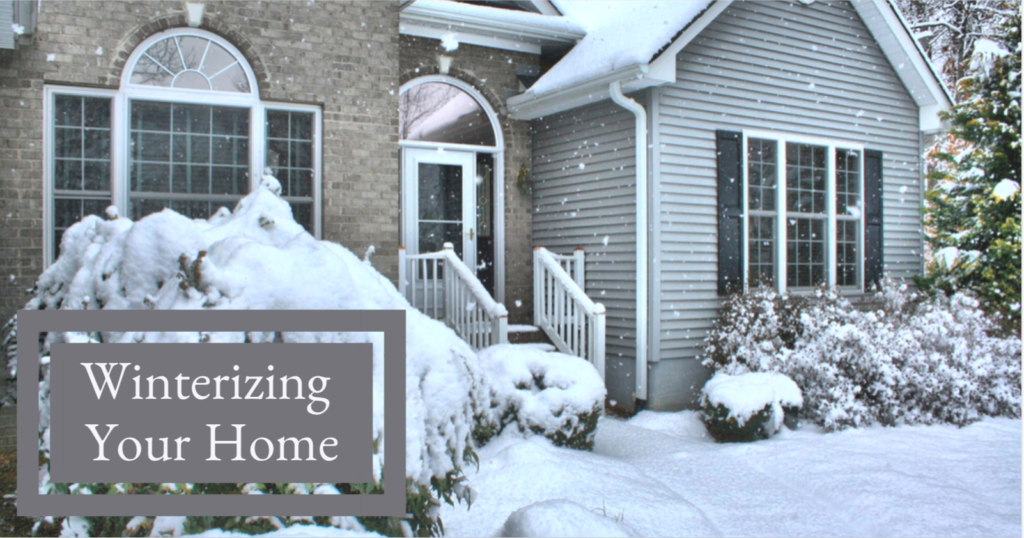November 7, 2023
Categories: Education & Security, Financial Planning, Home Ownership

By Dawn Kellogg
In the region of the country where we live, winter inevitably takes a toll on our property. Your home is your biggest asset, so why not take extra steps to protect it as we near the colder weather? The purpose of winterizing your home is to avoid higher energy costs and any damage caused by ice and snow. Even if you are a renter, it’s important to protect your contents against the ravages of winter.
Now is a good time to start winterizing your home. If you are planning on doing it yourself, work at your own pace. If you need to hire professionals to do some of the work, it’s best to plan that asap – many services are already booked up. If you are a renter, talk to your landlord about how you can work together to protect the property and its contents and cut down on energy bills.
Clean the Gutters – Gutters direct rainwater and snow away from your roof to prevent water from seeping in and causing structural damage. But gutters can’t do their job if they’re clogged with leaves and debris. Whether you hire someone to do this for you, or climb a ladder yourself, make sure your gutters are cleared by the first snowfall.
Check Smoke Detectors – When you change clocks to standard time, make it a standard practice to change the batteries in your smoke detectors. Once you’ve replaced the batteries, test the detectors: it’s as simple as pushing the button to make sure the alarm goes off. You should also replace any smoke detectors that are over 10 years old.
Inspect the Roof and Attic – Make any repairs so that it won’t leak in rain and snow. If you have an attic, replace or add insulation to keep drafts out.
Check the Chimney – If you have a fireplace, make sure that the chimney is clear of any buildup. A dirty chimney can be a fire hazard so hiring a chimney sweep to ensure it’s clear will make it safe to have those cozy winter fires. A professional sweep, certified through the Chimney Safety Institute of America (CSIA), will clean the chimney and inspect the fuel venting system. The National Fire Protection Association recommends annual chimney inspections.
Weatherproof Windows and Doors – Cold air can creep in through windows and doors, so be sure to replace any weatherstripping. Apply caulking to seal any gaps around windows. You can also apply window film to keep out the cold. A door sweep on the bottom of your door will also keep out any drafts.
Protect Pipes – Frozen pipes can burst during the winter and cause major problems. Know the location of your main water shutoff so you can access it quickly in an emergency. Drain water from outdoor sprinkler systems and garden hoses. Disconnect garden hoses from faucets and store them in a garage or shed. Cover outdoor faucets. Fix or replace any broken windows so that cold air can’t get into a room and freeze pipes. If you’re going to be away from your home for any length of time, keep your thermostat set to about 55 degrees Fahrenheit so that your pipes won’t freeze.
Service your HVAC system – Replace your furnace filter and schedule a service appointment so that your heating system is ready to go before you need it. Furnaces that aren’t cleaned at least once a year can wear out more quickly and can stop working altogether. And soaring energy costs make it more important than ever to ensure the furnace is running efficiently.
Cover patio furniture with weatherproof covers or store it away in a garage or shed – Protecting your outdoor furniture from damage during the winter will extend its life.
Make sure Snow Removal Tools are Accessible – Make sure that all your snow removal tools like snowblowers, shovels, de-icing agents like salt and sand are easy to access. If you need to purchase new tools, buy them any time of year except during winter with supplies are low and prices are high.
Winterizing your home can be a DIY chore, but as with many home improvement projects, you might want to enlist the help of a professional who can do it more quickly and easily. If you are doing this on your own, allow yourself plenty of time before cold weather arrives. If you see any issues that could pose a hazard to yourself or your property, call a professional.
